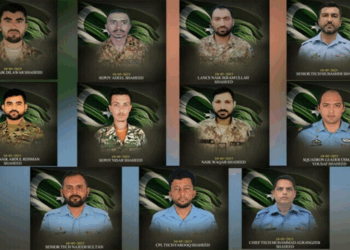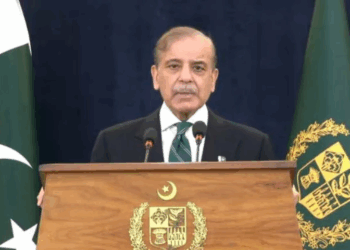Rawalpindi, May 12, 2025: The Pakistan Armed Forces have concluded Operation Bunyanum Marsoos with what military officials described as “decisive and proportionate” success in response to Indian military aggression during the conflict now termed Marka-e-Haq, which spanned from April 22 to May 10, 2025.
According to a statement issued from Rawalpindi, the operation was launched in retaliation to India’s unprovoked and deadly attacks on May 6 and 7 that resulted in the deaths of numerous Pakistani civilians, including women, children, and the elderly. Military officials said the action was a fulfilment of Pakistan’s vow to seek justice for the victims of Indian aggression.
“Alhamdulillah, the Pakistan Armed Forces have honoured their promise to the nation,” the statement read. “With the help of Almighty Allah, we were able to respond with strength, precision, and restraint.”
Operation Bunyanum Marsoos featured coordinated tri-services engagement across air, land, sea, and cyber domains. Utilizing long-range Fatah series missiles (F1 and F2), precision air munitions, loitering drones, and long-range artillery, Pakistan targeted 26 military installations and support facilities across Indian Illegally Occupied Jammu and Kashmir (IIOJK) and mainland India.
Key targets included:
- Air and Aviation Bases: Suratgarh, Sirsa, Bhuj, Naliya, Adampur, Bhatinda, Barnala, Halwara, Awantipura, Srinagar, Jammu, Udhampur, Mamun, Ambala, and Pathankot.
- BrahMos Missile Storage Sites: Beas and Nagrota.
- S-400 Air Defence Systems: Neutralized at Adampur and Bhuj.
- Logistical Infrastructure: Field supply depots at Uri, radar stations at Poonch, and command centers at KG Top and Naushera.
- Intelligence Installations: Units and proxy training facilities at Rajauri and Naushera allegedly involved in cross-border terrorism.
The Pakistan Air Force also launched precision strikes that reportedly disrupted India’s air capabilities, while drones flew over sensitive Indian regions including New Delhi, signaling Pakistan’s extended reach and deterrence capabilities.
Simultaneously, Pakistan conducted comprehensive cyber operations targeting Indian military communications and logistics infrastructure.
Despite active engagement on the eastern front, Pakistan’s security forces also countered an uptick in terrorism in Khyber Pakhtunkhwa and Balochistan, which military sources attribute to Indian-backed proxies attempting to stretch Pakistan’s operational focus. Security forces conducted successful counter-terrorism operations without interruption.
The military acknowledged the unified response of the nation, thanking the public for its support, the media for countering misinformation, the diplomatic corps for effective international advocacy, and political leaders across party lines for their unwavering backing.
Particular praise was reserved for Pakistan’s youth and cyber teams, described as “frontline soldiers” in the information domain. Scientists and engineers were credited for delivering key indigenous technologies that contributed to the operation’s success.
Military authorities emphasized that, despite the scale and intensity of the operation, Pakistan exercised strategic restraint by focusing exclusively on military and terrorist-linked targets and avoiding civilian casualties.
“Operation Bunyanum Marsoos was a textbook demonstration of integrated warfare,” the statement read. “It was precise, proportionate, and purpose-driven.”
The Armed Forces concluded with a warning: “No one should doubt that any future violation of Pakistan’s sovereignty will be met with a swift, comprehensive, and decisive response.”
Quoting the Holy Quran, the statement ended with:
“They plan, and Allah plans. And Allah is the best of planners.” (Surah Al-Anfal)
Pakistan Zindabad.
Afwaj-e-Pakistan Paindabad.







